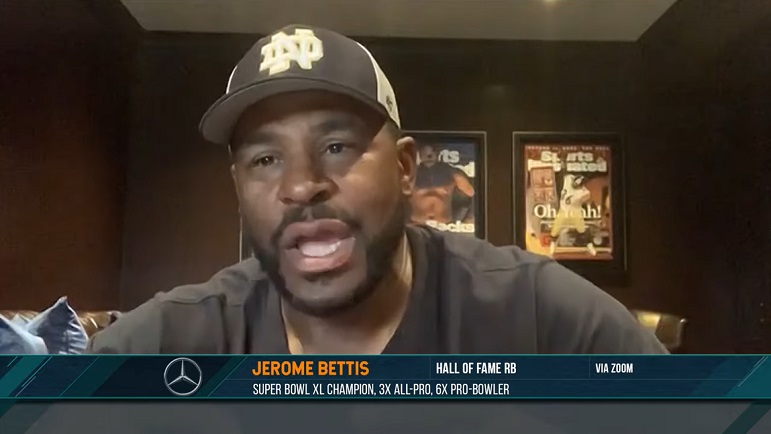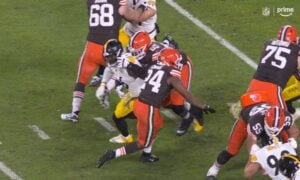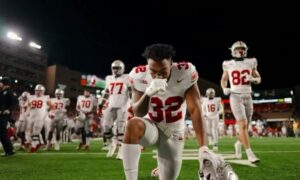Former Pittsburgh Steelers running back Jerome Bettis was a guest on The Dan Patrick Show on Tuesday, and he was asked his opinion on the devaluation of running backs in the NFL. Najee Harris spoke out about it Monday, and Bettis offered his insight today.
Bettis blamed the shift on colleges running a more pass-happy, wide-open offense, which has led kids who would’ve been bigger running backs to switch positions to have a shot to play in college.
“So now the talented kids are switching positions, so you don’t have the full range of running backs that you can go all over the country and get a 6-foot-2, 220-pound running back that can give you 25 carries a game. Those kids don’t exist anymore unless you go to five or six colleges,” Bettis said.
He added that instead of teams having one primary back, teams are now pivoting to two or three running backs to fill the role that one every-down back would’ve traditionally had. He noted there are exceptions, including Saquon Barkley, who couldn’t agree to a long-term extension with the New York Giants yesterday.
“When you get a special running back like a Saquon Barkley, you can’t find them. They don’t grow on trees,” Bettis said. “So you do have to pay them, but because of the place that we’re at, they don’t have to justify to the fans that, ‘Hey, we needed to pay him top dollar because he was a quality running back.’ We can afford to pay hardball with them because the market is dictating that. We don’t have to pay them that number. And it’s a terrible situation.”
It’s harsh, but at some point a player’s market and value is only what a team is willing to pay them. Leaguewide, the value of running backs has diminished due to the shorter career spans, so by the time those players are ready to hit free agency, teams don’t want to pay them a second contract.
Guys like Barkley or Josh Jacobs of the Las Vegas Raiders are probably the best players on their respective teams, but because they’re running backs, the front office isn’t going to pay them what they might be worth. That’s largely because most teams wouldn’t give them any sort of big guarantee on the open market, so teams don’t want to open up the can of worms of essentially bidding against themselves to keep a player under contract.
There’s no easy way to fix it. The position has been completely devalued due to a shift to more pass-heavy offenses and the aforementioned shorter career span. Yet running backs still play a crucial role for NFL teams. In the next CBA, this is an issue that will likely arise again and there’s likely going to have to be concessions made by the owners and the players to resolve the issue of the running back market.
Whether that includes letting running backs hit free agency sooner or some other solution, I’m not sure what exactly will or should be done. But something has to be done so there’s not just a repeating cycle of running backs failing to get paid what they likely deserve due to a leaguewide devaluation of the market.
It’s an issue that will soon affect Pittsburgh. The organization has make to a decision on Harris’ fifth-year option after the season — and soon after decide whether to extend the former first-round pick. The running back market problem is here to stay, and if you’re a Steelers fan, the discussion will be a whole lot louder a few short months from now.








